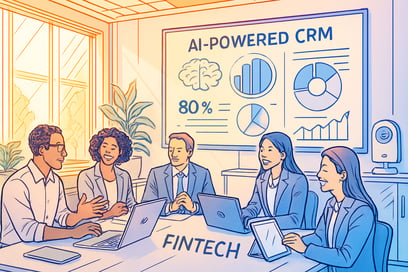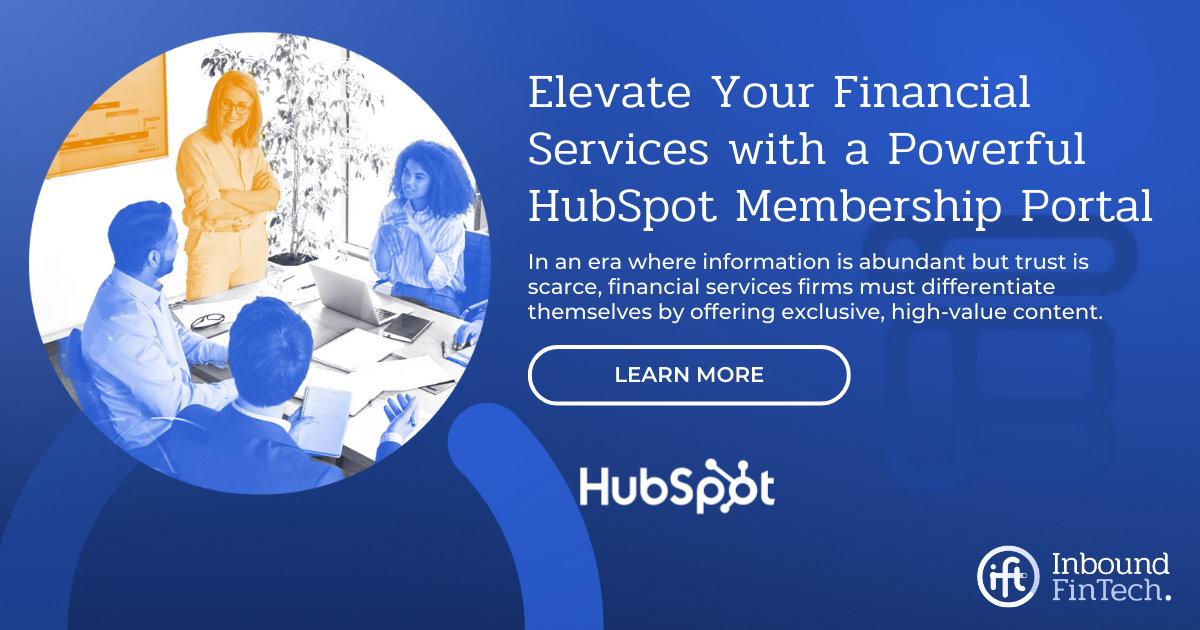Why FinTechs Need an AI-Powered CRM (Yes, now)
Discover why AI-powered CRMs are essential for FinTechs, enhancing efficiency, compliance, and customer satisfaction while driving growth and reducing administrative burdens.
co-CEO at Inbound FinTech Sheila Mitham is the co-CEO of Inbound FinTech, specializing in digital growth strategies for the Financial Services industry.

The financial world moves fast. Customers expect instant answers, regulators expect spotless compliance, and competitors expect to eat your lunch. In that environment, one tool has quietly become mission-critical for FinTechs and Financial Services businesses: the humble CRM. Only now it’s not so humble anymore. With AI plugged in, a CRM stops being a rolodex with lipstick and starts acting more like a co-pilot for growth.
Why bother with using a CRM at all?
FinTechs are drowning in data. Customer sign-ups, KYC checks, transactions, support tickets, app interactions… the list goes on. Without a single place to hold, clean, and use that data, you get chaos.
A CRM gives you:
- Better conversions. Yes, we always promise this. But the truth is that firms using CRM have seen conversion rates climb by up to 300%, with around £8 ROI for every £1 spent. Not bad maths, right?
- A single source of truth. Everyone from marketing to compliance works off the same record. No more spreadsheets hiding in someone’s Dropbox.
- Personalised experiences. Customers expect Netflix-level personalisation, not one-size-fits-all. CRM data helps you recommend the right product at the right time.
- Compliance peace of mind. Audit trails, permissions, GDPR tools. Less stress for your legal team.
- Scalability. When you grow from 1,000 to 100,000 customers in a year, your CRM won’t break a sweat.
In short, a CRM isn’t a nice-to-have. It’s the engine that keeps growth smooth, safe, and sane.
So where does AI fit in?
Here’s the fun part. AI turns the CRM from a system of record into a system of action.
- Predictive insights. Machine learning can spot which customers are about to churn, or who’s likely to need a loan next month.
- AI assistants. Tools like HubSpot’s new suite can draft emails, generate content, and answer queries like, “Show me all clients with expiring investments.”
Companies using AI-powered CRM are seeing sales productivity jump by 25–30%. It’s like giving every rep their own analyst, minus the analyst’s coffee bill.
Also, even the cleverest AI still needs rules. Isaac Asimov gave robots three laws; in FinTech, the first law might be: “Your CRM shall not annoy regulators, or through inaction, allow a regulator to ruin your quarter.”
AI Agents: your new digital colleagues
If CRMs are becoming the cockpit of FinTech, then AI Agents are the crew. HubSpot’s latest rollout includes specialised AI Agents that can take on focused jobs: prospecting, customer support, even service triage. Think of them as tireless teammates who never make a bad joke at the Monday meeting.
- Prospecting Agents scan and enrich lead data, so sales teams spend less time Googling and more time closing.
- Service Agents handle common tickets, escalating only the tricky ones that need a human touch.
- Custom Agents can be trained for your particular workflows, whether that’s onboarding new investors or chasing missing documents for compliance.
The beauty is in the blend: humans focus on relationships, while AI Agents quietly keep the machine humming in the background. And unlike some human colleagues, they don’t complain when you ask them to do the same task a thousand times, at least with existing technology.
The catch: data quality
Here’s the bit no one likes to admit.
AI is only as smart as the data you give it. Feed it messy, duplicated, half-baked data and you’ll get messy, duplicated, half-baked insights. MIT reckons bad data can cost firms up to 25% of revenue.
That’s why CRMs and AI are inseparable moving forward. A CRM should enforce clean, centralised data. AI then uses that clean data to do the clever stuff. Think of your CRM as the tracks, AI as the train. Without one, the other goes nowhere.
Proof it works
A fast-growing FinTech company we work with at IFT (I'd tell you the name, but they'd probably send their solicitors... or worse, their compliance team) used an AI-powered CRM to manage day-to-day work. Meeting notes? Summarised. Follow-up emails? Drafted. Administrative tasks? Automated.
The result? Hundreds of hours are freed up every week, and deals are closing noticeably faster. In fact, average deal velocity jumped by 22%, sales teams reported a 30% drop in time spent on admin, and customer satisfaction scores climbed by 15% in just six months.
Reflection: the cost of waiting
There’s always a temptation to wait. Wait for budgets. Wait for the “perfect” moment. Wait until the tech feels less new. But in FinTech, waiting carries its own cost. While you hesitate, competitors are personalising experiences, cutting admin, and scaling with AI.
Yes, adoption has a price. Implementation takes planning, and your teams need training. But the cost of delay is often higher: lost revenue, frustrated customers, and slower growth. In a market where expectations are sky-high, standing still is the riskiest move of all.
So the real question isn’t whether you can afford to adopt an AI-powered CRM. It’s whether you can afford not to.
.png?width=500&height=250&name=Inbound%20Fintech%20%20HubSpot%20%26%20RevOps%20Consultancy%20for%20FinTechs%20(2).png)



.png)